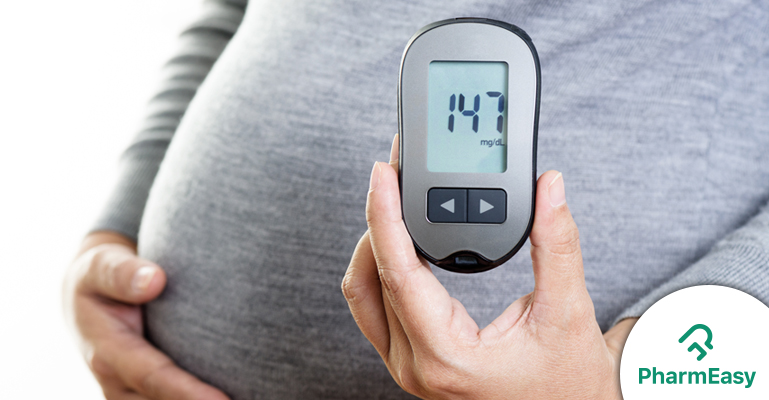What Should You Know About Gestational Diabetes During Pregnancy?
By Dr. Nikita Toshi +2 more

Get,

to manage your symptom
Get your,


4 Cr+ families
benefitted

OTP sent to 9988776655



You’ve successfully subscribed to receive
doctor-approved tips on
Whatsapp

Get ready to feel your best.

Hi There,
Download the PharmEasy App now!!


Register to Avail the Offer
Send OTPBy continuing, you agree with our Privacy Policy and Terms and Conditions

Hi There,
Sign up on PharmEasy now!!
Trusted by 4 crore+ families

OTP sent to 9988776655



You have unlocked 25% off on medicines




Code: NU25
By Dr. Nikita Toshi +2 more
Table of Contents
Gestational Diabetes in pregnancy is when pregnant women, who have never shown symptoms of diabetes, develop high blood sugar due to their pregnancy, it is known as gestational diabetes. In most cases, women develop this condition for the first time in their pregnancy, but in rare cases, it might be that an undiagnosed case of diabetes has worsened.
The human body uses insulin, a hormone released by the pancreas, to metabolize food into glucose which is the smallest unit of energy that the cells can use for biological processes. Pregnancy is a time of massive hormonal changes. The way a woman’s body uses insulin changes while she is carrying a baby. The body becomes slightly resistant to insulin so that the fetus receives more glucose for optimal growth. In some cases, the process goes a bit haywire, and the body becomes utterly resistant to insulin or stops producing it in enough quantities. This leads to high blood sugar levels, and the condition is known as Gestational Diabetes.

The high glucose levels in the blood can cause many complications for the mother and the baby. In most cases, the routine tests catch the problem in its infancy. However, it is essential to always be on the watch. Read on to find out more about the risk factors, symptoms and what you can do if you have gestational diabetes in pregnancy.
The reason for some women developing gestational diabetes is because of their placenta. HPL (human placental lactogen) is a hormone produced by the placenta. It helps in the baby’s growth, but it also alters the way the mother metabolizes carbohydrates and fats. It increases the woman’s resistance to insulin, and this raises the blood glucose level, so the baby gets the extra glucose for growth. After 15 weeks of pregnancy, another hormone, Human Placental Growth Hormone, is released. This is also a growth hormone and raises the mother’s blood glucose levels further. In most cases, the body adapts and keeps the sugar levels from getting too high. When the mother’s body cannot control the raised glucose levels, she is said to have gestational diabetes.
There are many risk factors associated with gestational diabetes in pregnancy.
All womenAl women go through a routine screening test for gestational diabetes between the 24th to 28th weeks of pregnancy. A Glucose Tolerance Test is administered. In this, the woman’s blood sample is taken in the morning when she has an empty stomach. Then she is told to drink a glucose solution. After two hours, another blood sample is taken to find out how the body has processed glucose.
Most women can control their condition by sticking to the exercise and diet regime that their doctors have chalked out for them. Those who cannot are given anti-hyperglycemic medicines. Some might even need insulin injections which are given thrice a day. You will have to maintain tight control over your blood sugar as it leads to severe complications if it gets too high.
If the mother has gestational diabetes, the baby is at risk of the following scenarios:
High amounts of glucose lead the baby’s body to produce extra insulin. This can make them grow very large. The downside of this is that the baby may get stuck in the birth canal because of being overweight and may require a cesarean operation.
Sometimes, mothers of babies who have gestational diabetes go into early or preterm labour. This increases the chances of the baby suffering from respiratory distress syndrome as its lungs would not have developed properly.
Since the babies produce more insulin to deal with the increased glucose in the mother’s blood, when they are born, they have a surplus of insulin. This produces low blood sugar levels right after their birth. If left untreated, it can lead to seizures and other complications. Usually, in such scenarios, a glucose solution is given to the babies to return their sugar levels to normal.
The babies of mothers who have had gestational diabetes are prone to type 2 diabetes in the future.
If you are at risk of developing gestational diabetes, no one can be sure that you can prevent it by following these tips. However, if you can adopt these habits before and during your pregnancy, you keep the odds in your favour.
Disclaimer: The information provided here is for educational/awareness purposes only and is not intended to be a substitute for medical treatment by a healthcare professional and should not be relied upon to diagnose or treat any medical condition. The reader should consult a registered medical practitioner to determine the appropriateness of the information and before consuming any medication. PharmEasy does not provide any guarantee or warranty (express or implied) regarding the accuracy, adequacy, completeness, legality, reliability or usefulness of the information; and disclaims any liability arising thereof.
Links and product recommendations in the information provided here are advertisements of third-party products available on the website. PharmEasy does not make any representation on the accuracy or suitability of such products/services. Advertisements do not influence the editorial decisions or content. The information in this blog is subject to change without notice. The authors and administrators reserve the right to modify, add, or remove content without notification. It is your responsibility to review this disclaimer regularly for any changes.

Leave your comment...
Comments